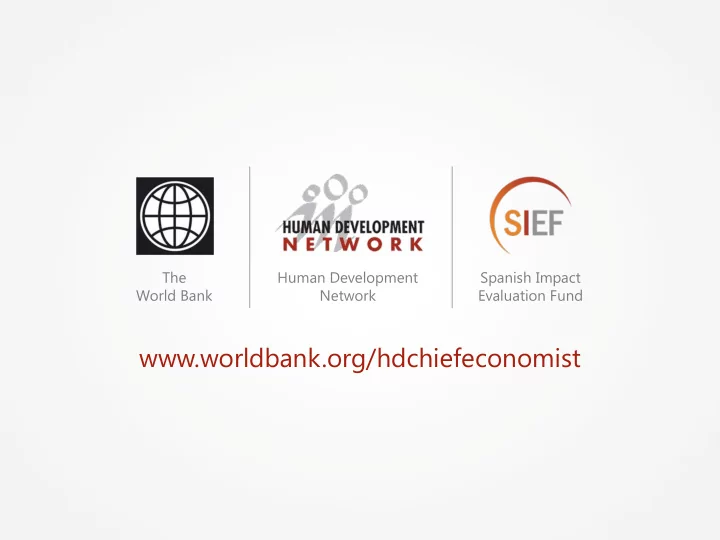

The Human Development Spanish Impact World Bank Network Evaluation Fund www.worldbank.org/hdchiefeconomist
Evaluating Impact: Turning Promises into Evidence Malawi Social Cash Transfer Programme Cyrus Jeke, Benjamin Kayala, Ezekiel Luhanga & Tayllor Spadafora Accra, Ghana May 2010
1. Background Designed to • Reduce poverty, hunger and starvation in all households living in the pilot area which are ultra poor and at the same time labour constraint 1 ; • Increase school enrolment and attendance of children living in target group households;. Currently has over 100,000 beneficiaries(70% are children) in 26,000 vulnerable households in seven districts. There are 300,000 households that are ultra poor and labour constraint that need to be reached. The pilot (Mchinji district) was subjected to one external evaluation by the Boston University. Some of the short term impacts which were observed by the evaluation included the following: improved school enrolment, food security, improved health as well as shelter. Economic impacts included strengthening local markets, access to credit and economic multiplier effects. Currently the range transfers is from MK600 – MK3600 (4.2 – 24 Dollars) and the average transfer is MK2000 (14 Dollars) Currently the government is planning to scale up the programme, however there has been debate on the transfer levels on how much money can achieve a significant impact.
2. Results Chain LONGER-TERM INPUTS ACTIVITIES OUTPUTS OUTCOMES OUTCOMES HIGHER ORDER GOALS Improved Reduced Increased Finances Designate 6 o o o o o coverage to food security poverty and Human new districts o Improved 6 districts starvation in resources for scale-up o health status beneficiary Community Equipment Train district o o o of households Social … level staff o beneficiaries Support and establish Committees Increased Community o enrollment trained Social and Beneficiaries Support o retention of identified Committees children in and paid on (CSSC) regular schools CSSC target o … monthly and generate o basis household listing of potential beneficiaries
3. Primary Research Questions What is the minimum level of household transfer to achieve a significant impact on the well-being of beneficiary households
4. Outcome Indicators Food security Nutrition security School enrolment Health seeking behavior Asset accumulation
5. Identification Strategy/ Method Utilize roll-out of programme to 6 new districts in 2011 with varying payment levels – representative at regional level Intended beneficiary households will be listed by trained Community Social Support Committees (by Village Cluster), 50% of district at the same time randomly assign 160 clusters in 6 districts to receive treatment or be control - 40 clusters per group (3 treatments and 1 control) randomly sample from treatment clusters (interview all households)
6. Sample and Data Ultra poor households without labor will be the sampling frame – approx. 10 % of total households in six new districts (Across the country) Randomized sampling from 160 clusters of the 3 treatment groups and 1 control group All beneficiaries in sampled clusters will be interviewed using a structured questionnaire A power calculation will determine size of sample needed (number of clusters) Assumptions: • Sampling of clusters is generalizable to the country given the defined targeting parameters of the programme
7. Time Frame / Work Plan July – December 2010: New districts will be trained and infrastructure March 2011: Community committees completed targeting/listing of beneficiary households April 2011: Assignment of treatment to clusters and baseline survey April 2011 – March 2012: Beneficiaries receive regular monthly payments April 2012: Follow-up survey
8. Sources of Financing Government of Malawi will take lead role with additional support from Development Partners
Zikomo Kwambiri!
Recommend
More recommend